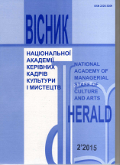VIRTUAL PRACTICES IN THE SYSTEM OF POST-NONCLASSICAL PRACTICES
DOI:
https://doi.org/10.32461/2226-3209.2.2015.138374Keywords:
post-nonclassical practices, virtual reality, virtual practices, post-nonclassical thinkingAbstract
The article deals with a possibility of using virtual practices as a form of post-nonclassical practices. Consideration of virtual practice through the post-nonclassical will allow a person to realize the heuristic potential both in natural-science knowledge and in social and humanitarian, which will allow estimating the ideological perspective of human activity in general. Special attention to an explication of a virtual perspective is paid.
The current stage of development of a civilization is followed by an increase of value of virtual practices in all spheres of life. Studying such practices is seen in improving and checking possibilities of virtual reality and to promote allocation of a Virtualistics to a certain scientific direction – virtuality.
Investigation of the concept of virtual practices arose recently in a connection with the expansion of human capabilities, in particular thanks to the latest technologies, which helped it with the development of a human civilization. The virtual reality not only changes our ideas of prospects of a person, and the directions experiments with the opportunities of a human body.
On the basis of the analysis of virtual and post-nonclassical practices necessary and sufficient conditions for its implementation become clear, namely: a presence of the practitionerswho are capable to think post-nonclassical and ready to work in non-standard conditions with a use of the latest technologies.
Having comprehended virtual practices through a prism of post-nonclassical thinking it should be noted:
•first, obvious is that fact that both virtual and post-nonclassical practices are part of human practices;
•second, considering the virtual reality we have a deal with abstract objects where all the processes that occur in it have nonlinear character;
•third, the integrity of the concept of "virtual reality" in a post-nonclassical paradigm is shown that when the person is in virtual reality the border between the world visible, the world objective and the world of thought of the person where these worlds are considered by the person in such timepoint as a unit is erased.Downloads
Published
Issue
Section
License
Authors who publish with this journal agree to the following terms:
1. Authors retain copyright and grant the journal right of first publication with the work simultaneously licensed under a Creative Commons Attribution License International CC-BY that allows others to share the work with an acknowledgement of the work's authorship and initial publication in this journal.
2. Authors are able to enter into separate, additional contractual arrangements for the non-exclusive distribution of the journal's published version of the work (e.g., post it to an institutional repository or publish it in a book), with an acknowledgement of its initial publication in this journal.
3. Authors are permitted and encouraged to post their work online (e.g., in institutional repositories or on their website) prior to and during the submission process, as it can lead to productive exchanges, as well as earlier and greater citation of published work (See The Effect of Open Access).


